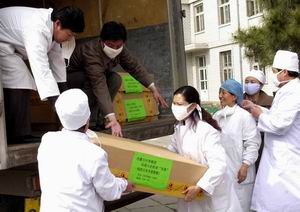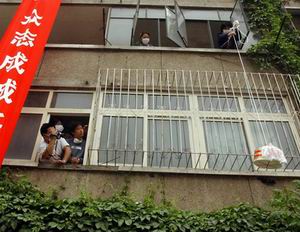 |
|
| Fighting SARS according to law |
| CCTV.COM 2003-04-29 10:04:30 |
|

The Chinese government has placed SARS under the Law on Epidemic Prevention and Treatment. This means the fight against SARS has now taken on a legal dimension. What implication does this have for governments, medical institutions and individuals?
China, along with many other countries, has taken quick measures after the outbreak of SARS. One of them is amending the Law on Epidemic Prevention and Treatment. The disease is the latest addition to the 36 epidemics found to have a high contraction rate, broad affection area, and severe consequences.
Zhang Chunsheng, Member of NPC Legal Committee said, "Conquering a deadly epidemic like SARS calls for joint efforts from all parts of society--this is also the central idea behind this law. It spells out obligations for each player in the society -- governments and medical institutions, as well as individuals."
But for a public unprepared for the sudden attack, the obligations they and others have, are still unclear.
Experts say according to the law, once the spread of an epidemic is discovered, it must be immediately reported by the local disease control department all the way up to the Ministry of Health. The government officials and medical workers concerned must report the situation promptly and truthfully. Anyone trying to cover up the figures or directing others to do so will be subject to administrative penalties or criminal sanctions. Some citizens are worried about the consequences brought by patients who chose to neglect imposed quarantine measures.

A citizen asked, "I heard reports that one SARS patient escaped from the hospital. Will such patients bear legal responsibility?"
Zhang Chunsheng explained, "Such conduct will proliferate the source of contagion. The law clearly stipulates confirmed SARS patients and suspected ones shall be under compulsory quarantine. This measure will of course, curtail that individual's liberty to a certain extent. But this is necessary. First, it will help aid treatment. Second, it can help effectively contain the disease. It's in the public interest, so patients should cooperate with the relevant authorities."
Putting epidemic patients under quarantine is a common practice in many countries. South Korea, in its recently amended law for instance, stipulates that SARS patients must be isolated. Suspected cases must be subject to a 10-day quarantine period. Violators will be subject to fines or criminal sanctions.
Similar measures have been adopted in Singapore and Sweden. Experts stress that under the law, all institutions and individuals within China must comply with the medical inquiries, check-ups and disease prevention and control measures relating to SARS conducted by disease control agencies. They say that the law provides the legal basis for handling the SARS crisis, rather than acting on personal preferences.
Experts say that placing SARS under the law means that citizens become persons protected by law, who at the same time bear explicit obligations. A strong sense of self-protection coupled with concern for the well-being of others, is fundamental in winning the battle against SARS.
|
|
Editor: Inner Wu CCTV.com
|
|
|
|
|
|
 |









